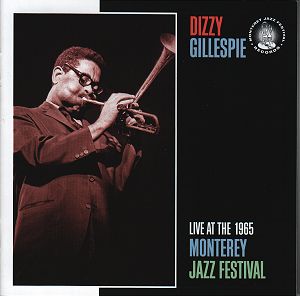1. Introduction
2. Trinidad, Goodbye
3. Day After
4. Poor Joe
5. Dizzy’s Comedy Sketch
6. A Night in Tunisia
7. Band Introduction
8. Ungawa
9. Chega de Saudade (No More Blues)
Dizzy Gillespie – Trumpet, vocals
James Moody – Flute, tenor sax
Kenny Barron – Piano
Christopher White – Bass
Rudy Collins – Drums
Big Black – Congas
Dizzy
Gillespie was a popular performer at the Monterey
Jazz Festival and you can hear why on this
recording, which has never been released before.
The audience loves his mixture of high-powered
jazz and wacky humour. This particular line-up
of the Gillespie Quintet had been together
for nearly three years and their togetherness
shows, although the rhythm section gets temporarily
lost during James Moody’s barnstorming solo
on Trinidad, Goodbye. The frantic tempo
of this number also makes Dizzy’s solo rather
fragmentary, but Kenny Barron produces a more
integrated solo.
Day
After, written in memory of Billie Holiday,
is a slow ballad which allows Dizzy to construct
a thoughtful solo, bending and squeezing notes
with aplomb. Poor Joe is a calypso
with Dizzy contributing a jovial vocal followed
by a fiery trumpet solo. Dizzy’s Comedy
Sketch is the chance for some verbal interplay
between Gillespie and bassist Christopher
White, with ironic jokes on White’s surname
and reference to a lady called Sybil Rights.
White’s double bass introduces the bustling
A Night in Tunisia, which includes
trumpet and flute in pleasing harmony and
more lively solos from Gillespie and Moody,
after which Christopher White gets a long
but quite interesting solo.
Ungawa
features guest conga drummer Big Black, although
even I (a drummer) find a nine-minute conga
solo a bit too much. This track segues into
a brief No More Blues to round off
the concert. Overall it’s an enjoyable if
sometimes self-indulgent session but not essential
for everyone’s collection. The recording quality
is occasionally below par and Dizzy’s small
groups have often sounded more together –
for example, in their late 1950s manifestation,
with Les Spann on guitar and Junior Mance
at the piano. If you haven’t heard their 1959
album Have Trumpet, Will Excite, investigate
it as soon as possible.
Tony
Augarde
